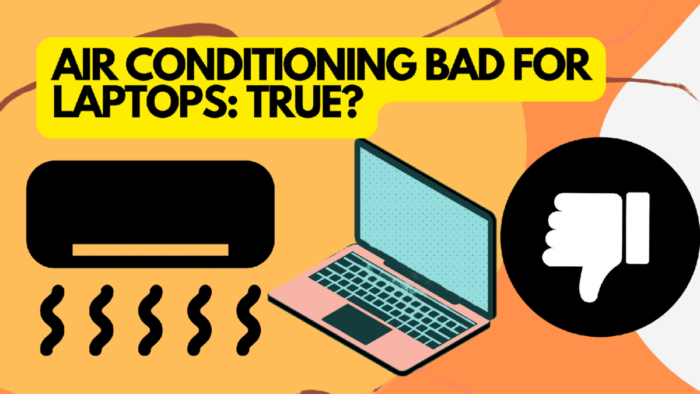In today’s modern age, laptops have become a crucial part of our daily routine. They have made our lives much easier and convenient. However, with the increasing demand for better performance and longevity of laptops, many users have started using air conditioning units to cool down laptop. The question that arises is whether laptop air conditioning is actually beneficial or harmful in the long run? In this article, we will explore the various risks associated with air conditioning for laptops and whether it is a good idea to use an air conditioner to keep your laptop cool.

What are the dangers of using air conditioning for a laptop? Here are four risks to consider.
Air conditioner for laptops has become a common feature in many households and offices, providing a cool and comfortable environment during hot weather. However, have you ever wondered if your laptop is safe with an air conditioner running in the same room? The answer may not be as straightforward as you think. Laptop air conditioning can potentially harm your device in various ways. It can blow air that is too cold, leading to condensation buildup, which can damage the laptop’s internal components.
Even the flow of air from the air conditioner can cause problems. In this article, we will explore the risks associated with using air conditioning around laptops. But before we delve into the details, it’s important to note that this discussion specifically refers to air conditioners that cool air through air compression. Other cooling systems, such as swamp or evaporative coolers, work on different principles and pose an entirely different set of risks to computers, such as the serious risk of condensation buildup.
#1 Cold Air

Air conditioning a laptop with cold air can pose significant risks to the device’s internal components. One of the primary dangers of using cold air to cool a laptop is the potential for condensation to form. This can lead to water damage and even hardware failure, ultimately rendering the device useless.
Condensation occurs when warm air comes into contact with a cold surface. When air conditioning is used to cool a laptop, the cold air can cause the internal components to become colder than the surrounding air, leading to the formation of condensation. If the moisture from the condensation is not dried off quickly, it can cause corrosion and short circuits in the laptop’s circuit board, causing irreversible damage.
Laptops that are used in humid environments are particularly susceptible to this problem. The increased moisture in the air can exacerbate the formation of condensation, making it even more important to avoid using cold air to cool the device.
To prevent the formation of condensation and keep your laptop safe, it is recommended to use a laptop cooling pad instead of air conditioning. A cooling pad is designed to provide adequate airflow to the laptop’s internal components, keeping them cool without exposing them to cold air. Additionally, it is essential to avoid placing the laptop in areas where it may be exposed to cold drafts, such as near air conditioning vents or open windows.
#2 Condensation
When using an air conditioner to cool a laptop, there is a significant risk of condensation forming on the internal components of the device. Condensation occurs when warm air meets a cold surface, causing moisture to form. The colder the surface, the more significant the amount of moisture that can accumulate.
If condensation forms on a laptop’s internal components, it can lead to water damage and hardware failure. The moisture can corrode metal components and cause short circuits, leading to permanent damage. This can render the device unusable and may require costly repairs or replacements.
To prevent condensation from forming, it is recommended to use a laptop cooling pad. A cooling pad provides adequate airflow to the laptop’s internal components, preventing the buildup of heat and moisture. In addition, it is essential to avoid using the laptop in humid environments or exposing it to cold drafts.
If you suspect that condensation has formed on your laptop’s internal components, it is important to take immediate action. Turn off the device and unplug it from the power source, then allow it to dry completely before attempting to turn it on again. If the damage is severe, it may be necessary to seek professional repairs or replacements.
#3 Dry Air
Using an air conditioner to cool a laptop can result in dry air, which can be unhealthy for both the user and the device. Dry air can cause several issues, including dry skin, sore throats, and respiratory problems. When the air conditioning unit removes moisture from the air, it can also dehydrate the laptop’s internal components, leading to overheating and reduced performance.
To prevent the risks associated with dry air, it is recommended to use a laptop cooling pad instead. A cooling pad provides adequate airflow to the device’s internal components, preventing the buildup of heat and moisture. This reduces the risk of dehydration and overheating, prolonging the lifespan of the device.
In addition to using a cooling pad, it is also essential to ensure proper ventilation for the laptop. Keeping the device on a hard, flat surface and avoiding obstructing the air vents can help promote proper airflow and prevent the accumulation of heat and moisture.
Overall, the risks associated with dry air make using an air conditioner to cool a laptop an unsuitable option. The use of a cooling pad and proper ventilation can help prevent dehydration and overheating, prolonging the lifespan of the device and promoting healthier air for the user. By taking these precautions, you can ensure that your laptop stays cool and performs optimally without compromising your health.
#4 Moving Air
Another risk of using pc air conditioning to cool a laptop is the movement of cold air. When using an air conditioning unit to cool a laptop, the cold air is directed towards the device, which can cause the surrounding air to circulate and create a draft. This can be uncomfortable for the user, especially if they are in a colder environment.
Moreover, the movement of cold air can also cause condensation to form on the laptop’s internal components, which can lead to corrosion and damage to the device. This can reduce the lifespan of the laptop and potentially result in data loss.
To avoid the risks associated with laptop cold air circulation, it is recommended to use a laptop cooling pad or ensure proper ventilation. These alternatives provide sufficient cooling without the need for directed airflow, reducing the risk of condensation and damage to the device.
In addition, ensuring that the laptop is not in a drafty area can also help prevent discomfort for the user. Keeping the device in a stable, warmer environment can help maintain its performance while reducing the risks associated with air conditioning.
WHAT ABOUT THE AIR CONDITIONING AND THE LAPTOP SCREEN?
While using an air conditioner for a computer or a pc air conditioner to cool a laptop, it is important to consider the impact on the laptop screen. The cool air blown by the air conditioner can cause a temperature difference between the screen and the surrounding environment, which can lead to moisture buildup and condensation on the screen.
This can result in a foggy appearance on the screen, making it difficult to see and use the laptop. Additionally, the moisture buildup can damage the screen and cause permanent damage, reducing the lifespan of the device.
To avoid the risk of condensation on the laptop screen, it is recommended to use a laptop cooling pad or ensure proper ventilation. These alternatives provide sufficient cooling without the need for directed airflow, reducing the risk of moisture buildup on the screen.
Moreover, ensuring that the laptop screen is not exposed to direct cold airflow can also help prevent condensation. Keeping the device in a stable, warmer environment and avoiding placing it directly in front of the air conditioner for computer or pc air conditioner can help maintain the laptop screen’s integrity.
Can an air conditioner prevent a laptop from overheating?
It is a common misconception that an air conditioner blowing directly on a laptop can prevent it from overheating. While it may seem like a logical solution, blowing cold air directly onto the laptop can cause more harm than good.
In fact, if you notice your laptop blowing hot air, it is an indication that the device is already overheating, and the internal cooling system is struggling to keep up. In this case, using an air conditioner blowing directly on the laptop can exacerbate the problem by causing a significant temperature difference between the internal components and the surrounding environment.
The best way to prevent a laptop from overheating is to ensure proper ventilation and avoid blocking the device’s air intake and exhaust ports. Using a laptop cooling pad, elevating the device to increase airflow, and regularly cleaning the internal components can also help maintain optimal temperatures and prevent overheating.
If your laptop continues to blow hot air, it may be a sign of a more significant issue, such as a malfunctioning cooling system or clogged air vents. In this case, it is recommended to seek professional assistance to diagnose and repair the issue.
Computer Rooms

When it comes to computer rooms, air conditioning is crucial to maintaining a stable environment for electronic devices such as laptops and computers. Without proper air conditioning for computers, the temperature and humidity in a computer room can rise to dangerous levels, causing equipment failure and even data loss. AC for laptops is just as important since these devices can quickly overheat and become damaged if the surrounding environment is too warm.
Air conditioning for computers not only helps to regulate temperature and humidity but also improves air quality by filtering out dust and other particles that can harm sensitive electronic components. In addition, air conditioning can help to reduce static electricity, which is a common problem in dry environments and can cause damage to computer hardware.
However, it’s important to note that simply having air conditioning for computers is not enough. The system must be properly maintained to ensure that it is functioning efficiently and effectively. This includes regularly cleaning and changing air filters, monitoring temperature and humidity levels, and scheduling routine maintenance checks.
Frequently Asked Questions
Can cold air from an air conditioner damage my laptop?
Yes, cold air from an air conditioner can potentially damage your laptop by causing the internal components to contract. This can lead to issues such as damage to the hard drive or other critical components.
Can air conditioning cause condensation on my laptop?
Yes, air conditioning can cause condensation on your laptop, especially when the air is too cold or there is high humidity. Condensation can lead to water damage and short circuits in the laptop’s internal components.
Is it okay to use a laptop air conditioner to keep my laptop cool?
It is not recommended to use a laptop air conditioner as they can create temperature imbalances that can harm your laptop. Additionally, laptop air conditioners may not have proper ventilation, which can cause overheating in your laptop.
Why is my laptop blowing hot air when the air conditioner is on?
When the air conditioner is on, the temperature in the room drops. As a result, your laptop will try to maintain its temperature by blowing hot air out. This is a natural process and not a cause for concern.
Can air conditioning affect the lifespan of my laptop?
Yes, air conditioning can affect the lifespan of your laptop. Exposure to very cold or very hot temperatures can cause damage to the internal components of your laptop, leading to a shorter lifespan.
How can I protect my laptop from the negative effects of air conditioning?
To protect your laptop from the negative effects of air conditioning, you should avoid placing it directly under or in front of an air conditioning vent. Additionally, you can use a laptop cooling pad or elevate your laptop to improve air circulation and prevent overheating.







You must be logged in to post a comment.